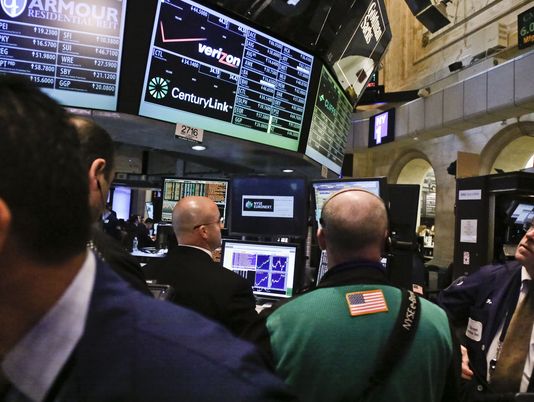Stocks surge as Dow sets fresh 5-year high
NEW YORK — Start chilling the Champagne. The Dow Jones industrial average is charging higher again after a brief bout of weakness and is within 89 points of hitting a fresh all-time high.
The Dow shot up 175 points Wednesday to 14,075.37, after a 116-point surge Tuesday. The back-to-back triple-digit gains mark a new bull market high. It also erases Monday's 216-point loss, which was sparked by renewed political fears in Europe. The powerful blue-chip stock rebound puts on hold — at least for now — any talk of a price correction, which had been gaining traction on Wall Street.
The Dow's record high was 14,164.53 on Oct. 9, 2007.
The Dow's two-day surge was driven by a combination of factors:
• More market-friendly talk from Federal Reserve Chairman Ben Bernanke.
• A sense that the eurozone wouldn't unravel despite political gridlock in debt-strapped Italy after Monday's elections.
• And a growing belief that the economic recovery in the U.S. would not be snuffed out even if $85 billion in automatic spending cuts start to kick in March 1 barring an 11th-hour fix by Congress, says Carmine Grigoli, chief investment strategist at Mizuho Securities USA.
With recent headwinds receding, the bull found new life as reasons to take profits dwindled.
"There isn't a clock on bull markets," says Grigoli. "Bulls don't die of old age. Bull markets die when the fundamentals and (business conditions) shift and change and worsen. But nothing has changed in the fundamental environment that argues for a more conservative stance on the stock market in the short term."
What's got the Dow back in rally mode:
• Fed says stimulus to continue. Last week, investors hit the sell button when minutes of the last Fed meeting raised the prospect of the central bank dialing down its bond-buying program sooner than expected to avoid risky outcomes such as higher inflation, the formation of asset bubbles and financial instability. But Bernanke threw cold water on that idea in his two-day testimony before Congress that ended Wednesday when he defended the Fed's policy of buying bonds to keep borrowing costs low and provide a lift to the economy.
"The Fed minutes were just an excuse to sell," Grigoli says. "Everyone knew the Fed was not going to tighten monetary policy anytime soon."
• Italy's election shock will pass. Sure, the outcome of the Italian election, which put the nation's austerity and reform plans in limbo, was a "shocker," says Grigoli. "But people have put it in proper context after Monday's selloff. It is not likely to lead down a path that will destabilize Europe and lead to the demise of the eurozone."
• Sequestration won't sink the economy. Even if the government's spending cuts kick in Friday, it is unlikely to result in a big enough drag to cause a recession or mark an end to the U.S. economic recovery. While it's estimated that the draconian cuts will trim upwards of half of a percentage point off of economic growth this year and result in hundreds of thousands of lost jobs, there's still enough economic strength to support corporate earnings and stocks.
Indeed, as investors learned during the year-end fiscal cliff fight, political grandstanding does not kill bull markets.
"The fiscal cliff wasn't the end of the world," says Tim Hopper, chief economist at TIAA-CREF. "The fiscal cliff resolution didn't solve all our problems (but the market survived). The government is not going to turn out the lights out on Friday."










